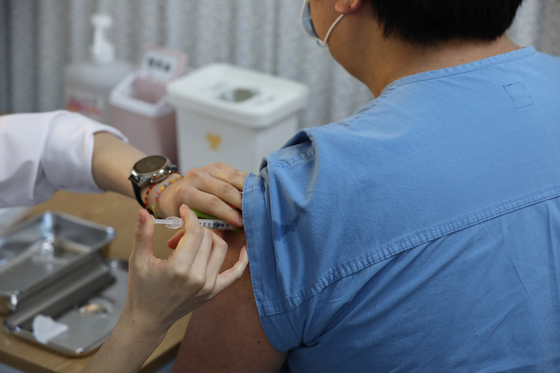
On the morning of the 27th, medical staff are getting the Pfizer vaccine at the Central Vaccination Center at the National Medical Center in Euljiro, Jung-gu, Seoul. yunhap news
According to the Korea Centers for Disease Control and Prevention on the 1st, 765 people across the country were vaccinated for one day on the 28th of last month, the third day of vaccination against the novel coronavirus infection (Corona 19). The number of domestic vaccinations was 11,127 on the first day (26th) and 1285 on the second (27th), totaling 21,177 people. The inoculation rate compared to the domestic population (based on 52 million people) is 0.041%. Some point out that the vaccination rate is slower than expected.
The vaccine vaccination for Corona 19, which started last week, is being carried out with the amount of AZ (78 million people) and Pfizer vaccine (58,5 million people) introduced for the first time in Korea. Both vaccines require two doses to obtain full immunity, and the first dose is currently being administered.
The cumulative number of AstraZeneca (AZ) vaccines was 26,13, and the cumulative number of Pfizer vaccines was 564. As of the previous day, AZ vaccination targets 31,161 people who are hospitalized, inhabited, and workers under the age of 65 at nursing hospitals, nursing facilities, and mental health and rehabilitation facilities nationwide. The vaccination rate compared to the subjects was 6.65%. Pfizer’s vaccination targets 56,000,170 medical staff and workers at the Corona 19 patient treatment hospital and life treatment center, with an inoculation rate of 1.0%.
Compared to the first day of vaccination, the 26th, the decrease in the number of vaccinations on the second and third days seems to be the effect of weekends and holidays. Most of the inoculations in nursing hospitals that do self-inoculation have not started in earnest, and nursing facilities that do in-home vaccinations or center vaccinations set the vaccination date on weekdays. An official from the Korea Centers for Disease Control and Prevention said, “Weekend nursing hospitals and nursing facilities have fewer workers and fewer vaccinations. In many places, nursing facilities set the vaccination date to be a convenient weekday for hospital treatment, considering what to do if an adverse reaction occurs.”
In the case of Pfizer vaccine, the first week of vaccination is given only at the central vaccination center in Jongno-gu, Seoul. Then, in the second week, it was decided to expand sequentially to five vaccination centers nationwide, and in the third week, the self-inoculation system dedicated to Corona 19 treatment. Due to the nature of Pfizer’s vaccine, which is difficult to defrost, dilution, and vaccination, it is said that the vaccination method is expanded in stages. The speed is bound to be slow. An official from a hospital dedicated to Corona 19 in Gyeonggi-do said, “I initially knew it was our hospital vaccination date on the 27th of last month, but I received a notice that it was’deferred’ two days ago. I heard it was because of Pfizer’s vaccination training. I expect to be vaccinated around the 8th to 9th of this month.”
Cho Eun-hee, an education guide for the Corona 19 Vaccination Response Promotion Team, said, “The vaccination is being performed according to the vaccination plan released by the government.” “I think it is difficult to compare the rates of flu vaccination and COVID-19 vaccination. The flu vaccine is given omnidirectional vaccination at local clinics nationwide, but the corona 19 vaccine is in the early stages of its introduction, so it cannot be done.”
The quarantine authorities plan to finish vaccinations for 780,000 AZ vaccines and 5.85 million Pfizers within this month. At the end of March, an additional 500,000 Pfizer vacancies will arrive, and if the vaccination staff at front-line vaccination centers and medical institutions become more proficient, the vaccination rate is expected to accelerate. In June, after vaccination is completed, the vaccination for the general public is expected to begin in earnest from July after vaccination is completed for residents of nursing homes and nursing homes, medical staff in charge of COVID-19.
Won-Seok Choi, a professor of infectious medicine at Korea University Ansan Hospital, said, “Aren’t we storing vaccines and vaccinating them now? The rate of inoculation is bound to depend on the amount supplied. “I don’t think the speed is slow considering the amount of goods coming in.”
Professor Jeon Byung-ryul of Cha Medical University (former head of the Centers for Disease Control and Prevention) stressed, “It is time to build public trust by paying attention to safety rather than speed warfare.” Professor Jeon said, “Because it is the initial stage of vaccination, there is a period until additional vaccines are available. “I think it makes more sense in the early stages of guaranteeing.”
However, some point out that after the initial one or two months, the introduction of the vaccine needs to be accelerated and intensive vaccination is necessary. Considering that the vaccine’s effectiveness is less than six months, the gap in immunity between those who vaccinated now and those who vaccinated in the fourth quarter could widen. If you are vaccinated in February or March, you may need to re-vaccine this fall. Ma Sang-hyuk, vice president of the Korean Vaccine Association, said, “To form group immunity, we need to receive as many vaccines as possible within a few months. “It is difficult if the vaccination time for the people spreads too far,” he said. “In the midst of a war to preoccupy the amount of vaccines around the world, the Korean government must hurry to introduce the vaccine.”
Reporter Esther and Hwang Soo-yeon [email protected]
![]()
